Table 1.
Role of PCs as anti-cancer agents through direct or indirect apoptotic mode of action.
| Phytochemicals (Pcs) or Derivatives | Source | Cancer Type | Mode of Action | Ref. |
|---|---|---|---|---|
Ursolic acid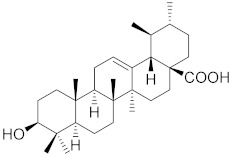
|
Oldenlandia diffusa | Lung cancer | Mitotic kinase activity inhibition | [71] |
| Punica granatum | Breast cancer | Anti-cancer property via Akt/mTOR signaling | [72] | |
Apigenin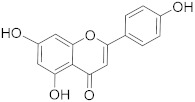
|
Sorghum bicolor | Colon cancer | Inhibiting ATP-binding cassette (ABC) transporter expression | [73] |
Quercetin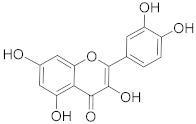
|
Vigna unguiculat | Colon cancer | Inhibiting multidrug resistance gene 1 (MDR1) expression | [74] |
Kaempferol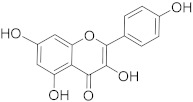
|
Alangium salvifolium | Ascitic lymphoma | Inhibition of dihydrofolate inhibition, thereby damaging DNA of a cancerous cell | [75] |
Lupeol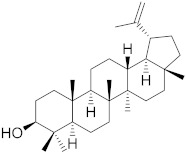
|
Dillenia indica | Leukemia | Induces PCD | [76] |
Aurantio-obtusin
|
Cassia tora | Cervical cancer | Inhibits proliferation and induces apoptosis | [77] |
Luteolin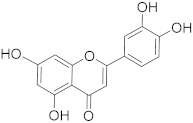
|
Eclipta alba | Glioma | Down regulating NF-κBleads to DNA damage and ultimately apoptosis. | [78] |
Paniculatine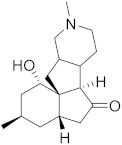
|
Celastrus paniculatus | Breast cancer | Growth inhibition followed by apoptosis mediated by p53 and mitogen activated protein (MAP) kinases | [79] |
Linalool
|
Cinnamomum cassia | Cervical carcinoma | Reduced expression of Her-2 oncoprotein | [80] |
Carthamin
|
Carthamus tinctorius | Colon cancer | Caspase-3, -7, and -9 upregulation and Bcl-2 downregulation | [81] |
Resveratrol
|
Vitis vinifera | Colorectal cancer | Regulation of p53 and inhibition of IGF-IR pathway | [82] |
Fisetin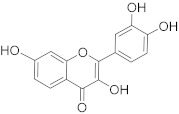
|
Fragaria ananassa | Hepatic cancer | Modulated mitogen activated protein kinases (MAPK) and CDK5 signaling | [83] |
Withaferin A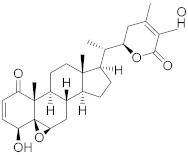
|
Withania somnifer | Colon cancer | Inhibition of (signal transducer and activator of transcription 3) STAT3 pathway | [84] |
Ferulic acid
|
Ferula asafetida | Mammary carcinogenesis | Reduction in cytochrome p450 levels | [85] |
Safranal
|
Crocus sativus | Cervical cancer | Inhibition of malignant cell line proliferation and induces apoptosis | [86] |
Limonene
|
Citrus sinensis | Breast cancer | Induction of apoptosis through upregulation of pro-apoptotic factors and down-regulation of anti-apoptotic factors | [87] |
Gingerol
|
Zingiber officinale | Colon cancer | G2/M cell cycle arrest, activation of PI3K/Akt pathway, and apoptosis induction | [88] |
Malic acid
|
Actinidia deliciosa | Brain tumor | Activates pro-apoptotic genes | [89] |
Podophyllotoxin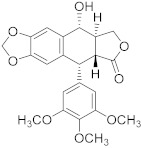
|
Podophyllum spp. | Testicular and breast cancer | Cell division blockage at metaphase of mitosis | [90] |
Berberine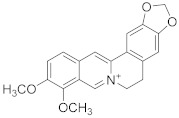
|
Berberis vulgaris | Colon cancer | Cell cycle arrest and synergistic effect with drugs | [91] |
Combretastatin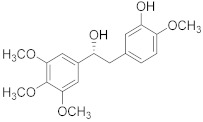
|
Combretum caffrum | Leukemia | Destabilization of microtubules | [92] |
Ingenol mebutate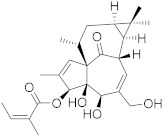
|
Euphorbia peplus | Prostate cancer | Suppression of P13/Akt pathway | [93] |
Genipin
|
Gardenia jasminoides | Medullobalstome | Increase in Bax level | [94] |
| Crocin | Crocus sativus | Prostate cancer | G2/M Cell cycle arrest | [95] |

| ||||
Bilobetin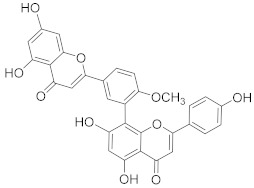
|
Ginkgo biloba | Leukemia | Cell cycle arrest at G2/M | [96] |
Amentoflavone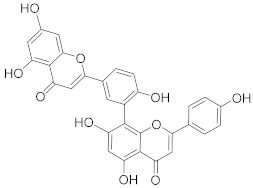
|
Selaginella tamariscina | Ovarian cancer | Inducing DNA damage by interfering in microtubule dynamics | [97] |
Brusatol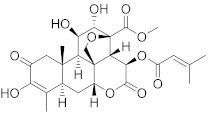
|
Brucea javanica | Lung cancer | Stimulation of ROS; G0-G1 cell cycle arrest and decrease in glutathione levels | [98] |
| Brucea javanica oil | Brucea javanica | Hepatocellular carcinoma | Upregulation of miRNA-29b and p53 expression levels | [99] |
Octahydrocurcumin
|
Curcuma longa | Hepatocellular carcinoma | Downregulation of murine double minute 2 (MDM2) expression levels | [100] |
